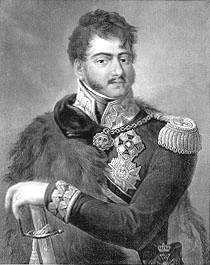|
|
| Józef Antoni Poniatowski | |
|
| |
| Noble Family | Poniatowski |
| Coat of Arms | Ciołek |
| Parents | Andrzej Poniatowski Maria Teresa Kinsky |
| Consorts | Zelia Sitańska Zofia Potocka |
| Children | with Zelia Sitańska: Józef Szczęsny Poniatowski; with Zofia Potocka: Karol Józef Poniatowski. |
| Date of Birth | May 7, 1763 |
| Place of Birth | Vienna |
| Date of Death | October 19, 1813 |
| Place of Death | Weiße Elster River, near Leipzig. |
Józef Antoni Poniatowski (May 7, 1763 - October 19, 1813), Polish prince and marshal of France, son of Andrzej Poniatowski and Countess Maria Teresa Kinsky, was born in Vienna, Austria.
Adopting a military career, he joined the Austrian imperial army when Austria declared war against the Turks in 1788, and distinguished himself at the storming on April 25, 1788, of Sabac, where he was seriously wounded. Summoned by his uncle, Poland's King Stanisław August Poniatowski, when the Polish Army was reorganized, he received the rank of major-general, and subsequently lieutenant-general, and devoted himself zealously to the improvement of the Polish-Lithuanian Commonwealth's military.
Jozef_Antoni_Poniatowski_3.jpg
In 1789, when Poland was threatened with Russian armed intervention, he was appointed commander of the Ukraine division at Bracław on the Bug River. After the proclamation of the Polish Constitution of May 3, 1791, he was appointed commander-in-chief, with instructions to guard the banks of the Dniester and Dnieper Rivers. On the outbreak of war with Russia, Prince Józef, aided by Tadeusz Kościuszko, displayed great ability. Obliged constantly to retreat, but disputing every point of vantage, he turned on the pursuer whenever he pressed too closely, and won several notable victories. At Połonna the Russians were repulsed with the loss of 3,000 men; at Dubienka the line of the Bug River was defended for five days against fourfold odds; at Zieleńce the Poles won a still more signal victory. Finally the Polish armies converged on Warsaw and were preparing for a general engagement, when a courier from the capital informed the Polish generals that King Stanisław August had acceded to the Targowica Confederation and had pledged the adherence of the Polish Army. All hostilities were therefore to be suspended.
After an indignant but fruitless protest, Prince Józef and most of the other Polish generals resigned their commissions and emigrated. During the Kościuszko Uprising (1794) Prince Józef — as he is affectionately referred to by Poles — again fought gallantly for his country, under his former subordinate Kościuszko. After the final, Third Partition of Poland, he resided for the next ten years in Warsaw as a private citizen. Following Napoleon Bonaparte's victory at the Battle of Jena and the ensuing evacuation by Prussia of her Polish provinces, Poniatowski was offered command of the National Guard; he set about reorganizing the Polish army, and upon Napoleon's creation of the Grand Duchy of Warsaw he was named its minister of war.
Jozef_Poniatowski_na_koniu.jpg
During the war of 1809, when an Austrian army corps under Archduke Ferdinand invaded the Grand Duchy, Prince Józef encountered them at the bloody Battle of Raszyn (April 19, 1809) and, though compelled to abandon Warsaw, ultimately forced the enemy to evacuate the Grand Duchy and captured Kraków. In Napoleon's campaign against Russia in 1812 Poniatowski commanded the Fifth Army Corps; and after the disastrous retreat of Napoleon's Grand Army, when many Poles began to waver in their allegiance to the French Emperor, Poniatowski remained faithful and formed a new Polish army of 13,000 men with which he joined Napoleon at the Battle of Lützen (1813).
Smierc_Poniatowskiego.jpg
In the campaign of 1813, Prince Józef guarded the passes of the Bohemian mountains and defended the left bank of the Elbe River. As a reward for his brilliant services at the three days' Battle of Leipzig, he was made a Marshal of France and entrusted with the honorable but dangerous duty of covering the French Army's retreat. Poniatowski heroically defended Leipzig, losing half his corps in the attempt, finally falling back slowly upon a bridge over the Elster River which the French in the general confusion blew up before he could reach it. Contesting every step with the overwhelming forces of the pursuers, Prince Józef refused to surrender, and covered with wounds plunged into the river, where he died fighting to the last. His relics were conveyed to Poland and buried in the cathedral on Kraków's Wawel Hill, where he lies beside Tadeusz Kościuszko and Jan Sobieski. His Mes souvenirs sur la campagne de 1792 (Lemberg, 1863) is a valuable historical document.
References
- Stanisław Kostka Bogusławski, Life of Prince Jņzef Poniatowski ( in Polish), Warsaw, 1831.
- Franciszek Paszkowski, Prince Józef Poniatowski (in Polish), Kraków, 1898.
- Correspondence of Poniatowski, edited by E. Raczyński, Poznań, 1843.
- Bronisław Dembiński, Stanisław August and Prince Józef Poniatowski in the Light of Their Correspondence (in French), Lemberg, 1904.
- Szymon Askenazy, Prince Józef Poniatowski (in Polish), Warsaw, 1905.
- This article incorporates public-domain text from the 1911 Encyclopaedia Britannica.
External links
- Jozef Poniatowski on Bellaonline (http://www.bellaonline.com/articles/art19988.asp)de:Józef Antoni Poniatowski
fr:Józef Antoni Poniatowski ja:ジョゼフ=アントワーヌ・ポニャトフスキ pl:Józef Poniatowski

